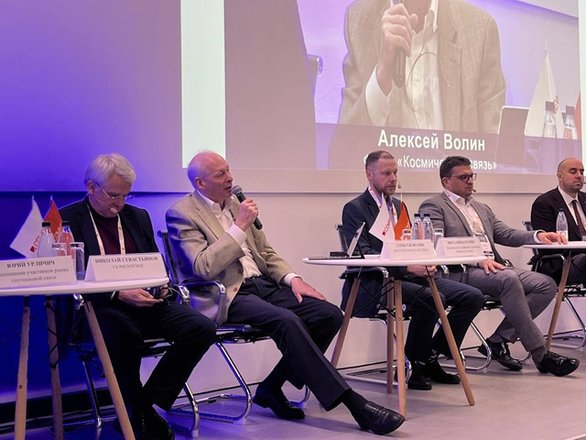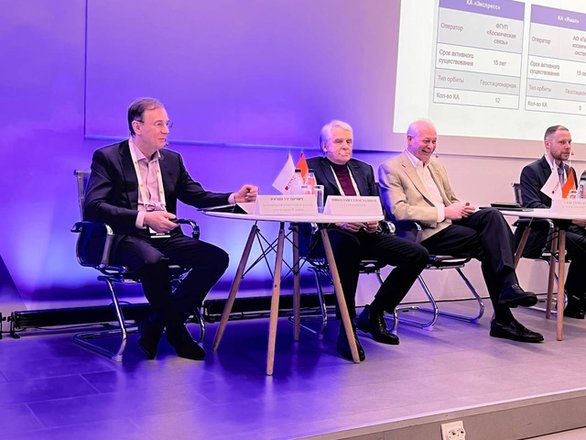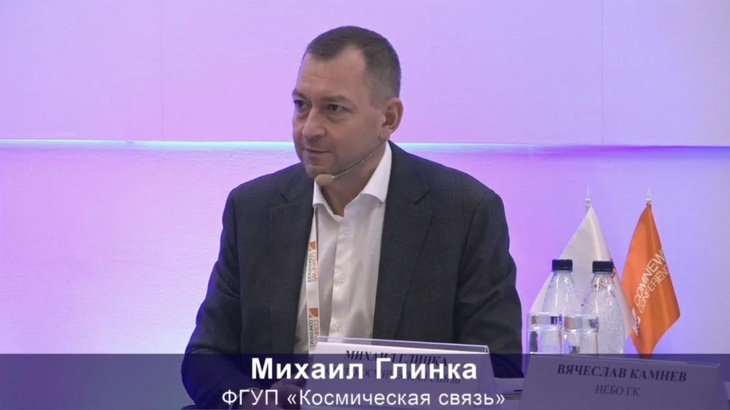What's on track of satellite: RSCC speaks about trends of Russian satellite industry at Satellite Russia 2023 conference
Alexey Volin, General Director of Russian Satellite Communications Company, and Yuri Urlichich, Chairman of the Board of the Association of Satellite Communications Market Players, Advisor to RSCC General Director, took part in the 15th federal conference "Satellite Russia 2023" held on 16 February in Moscow. RSCC was a general partner of the event.
During the plenary discussion, Alexey Volin talked about what had changed on the satellite market due to the sanctions and what needed to be done to persevere and ensure the development of the industry.
"First of all, plans for constellations’ bandwidth reservation have changed: now it is clear that we have to rely on domestic satellites only," said RSCC’s General Director. "At the moment, RSCC and Gazprom Space Systems fully cover the needs of Russian consumers. Secondly, the development strategies of the companies have also changed: both we and Gazprom Space Systems are planning to rely exclusively on our own forces in the near future. Thirdly, we now count entirely on domestic payloads when designing new satellites."
Alexey Volin also noted that without renewing the constellation and using flexible payloads, the country may find itself in a situation of satellite bandwidth shortage. According to the estimates of RSCC, as the time of manufacturing of satellites has increased to an average of 4 years, the shortage may occur as early as 2028 or 2029, if we do not replace satellites coming out of service.
Meanwhile, the volumes and demands for satellite bandwidth continue to grow, despite the ongoing laying of fibre-optic cables in small settlements, said RSCC’s General Director. This is evident from the programs RSCC is involved in, including the project to eliminate the digital divide: it is planned to provide about 150 settlements with access to communication and Internet services using a satellite. Russian Satellite Communications Company and RTCOMM have recently been dealing with this issue.
Active collaboration and increased integration between major Russian players are another trend in the satellite market that has emerged against the backdrop of sanctions: "We are aware of the fact that in the current environment we need to interact with each other, and our communication has intensified, including through competence centres. This trend has also resulted in the creation of the Association of Satellite Communications Market Players", summarized Alexey Volin.
In his turn, Yuri Urlichich made a broad overview at the plenary session of the existing domestic constellations and expected projects and outlined the current state of satellite communications in Russia and trends in the development of telecommunication space systems.
"The main trends in the development of satellite communications in the world and in our country in particular are convergence, globality, seamlessness and the construction of a common infrastructure that can reduce the unit cost of space communications. Many of these trends, I hope, will be represented in the systems that are part of the Sphere project," said Yuri Urlichich.
He also highlighted the main activities of the Association of Russian Satellite Communications Market Players: the new organisation will lobby interests and services of the players in government institutions and on the international market, participate in the creation of the regulatory and legal database and information exchange, and will also support research and technology projects and help raise investments.
Mikhail Glinka, Director of Operator and Corporate Solutions Department of RSCC, spoke at the session devoted to the VSAT market about the prospects of its development in the new reality.
"Having analysed the dynamics since 2014, we can say that Russian market is approaching saturation: thus, during 2022, only certain segments were growing, while the rest were stagnating. This is influenced by the global situation, the arrival of fibre-optic in hinterlands, and, perhaps, the pandemic," he said, adding that 71% of all VSAT subscriber stations are concentrated by 4 operators: RTComm.RU, AltegroSky Group, Iskra Group, and Eutelsat Networks. As for specific segments, the most promising one is maritime VSAT, as the aviation, rail and road segments in Russia are the most underdeveloped. According to findings by Comnews Research and RSCC's own data, a total of 1114 ships are connected to the maritime VSAT segment, and 435 of them receive communications and internet using satellite solutions of RSCC.


